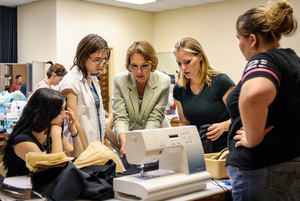Family and Consumer Sciences continually evolves

CHADRON – Family and Consumer Sciences at Chadron State College has a history as intricate and interesting as a family’s history. The program, which includes five degrees and six minors, has had enrollment varying from 30-75 majors, has about 15 graduates a year.
When Dr. Yvonne Moody, professor in Chadron State College’s Applied Sciences department, enrolled in Home Economics at CSC in the fall of 1971, she came in on the ground floor of a new phase of the program. During the first semester of her freshman year, she was enrolled in the last home ec class to be taught in Old Admin.
She recalls she and her classmates packed up the supplies and equipment in the three-room clothing, textiles and foods lab on the south side of the third floor in September and moved them to the newly constructed Burkhiser Technology Complex. A month later, they unpacked the materials in spacious new labs, totaling 2,678 square feet.
At the time, all the home ec majors were females, the faculty consisted of two women and it experienced a high rate of turnover, Moody recalls.
Moody graduated with her bachelor’s degree in 1974, returned to CSC as a GA in 1976 and was hired as a full-time faculty member in 1979.
Until 1984, the program included only two options, teaching and non-teaching. Soon after, Moody initiated partnerships with the business, legal studies and social work to broaden the scope of the degree options.
Collaborations have continued across the curriculum including Health, Physical Education and Recreation (HPER) adding human development, nutrition and aging and death course requirements to some of their degree options and health professions adding a nutrition class to its core.
“Employers demanded specialists. Being a generalist just wasn’t enough for our graduates anymore. The changes we made helped us maintain our numbers and keep the major alive,” Moody said. “It’s been a privilege to be involved with this program for so many years. The health of families is so important.”
The name, as well as the content, of the program has transformed over time. In 1995, the name changed to human ecology.
Moody joked about the choice saying they selected the phrase so they could keep everything that was monogrammed with “H.E.”
But as quickly as it came, the human ecology name was retired in 1997 in favor of Family and Consumer Sciences. The name reflects its diverse scope of disciplines: family relationships, hospitality, nutrition, wellness, textiles and design, merchandising and health and human services.
In addition to name and content changes, FCS students have changed over time, as well.
In the 1980s, a large number of non-traditional student and some Gulf War veterans, enrolled seeking retraining. The new options in wellness, family and legal issues, and early childhood education were popular, reducing FCS education majors to less than half the program’s total enrollment.
“We created entrepreneurs and met the demand for Head Start staff members,” Moody said of that era.
An important development served to introduce students to FCS as a possible major in the 1990s when two courses, Families in Society and Global Food Systems, were added as General Studies electives. Two additional FCS courses, Lifespan Wellness and Aging and Death, have since been added to the list of electives.
FCS faculty have known for years their students come to them as transfers or current CSC students who are changing majors.
“They don’t typically enroll as freshmen. They hear about us via word-of-mouth or take an Essential Studies Program course that piques their interest,” Moody said.
Speaking of interesting, a gem of Family and Consumer Sciences has long been the Child Development Center (CDC), the second longest running educational laboratory program for early childhood teacher preparation in the region. It was originally housed in Edna Work Hall until the program outgrew the space and moved to Burkhiser in 1972.
Another area of expansion was the advent of the Master of Science in Organizational Management: Human Services in 2006. It was the first non-teaching graduate degree in which students could customize their programs with electives emphasizing leadership, public health, nutrition and wellness, recreation or family studies.
“It’s been a good thing,” Moody said, citing the example of Phil Darley.
Darley, an MSOM graduate, returned to campus twice this month to lead a four-hour Mental Health First Aid course. He was able to secure his current position with Panhandle Mental Health following an FCS internship with the agency.
“Every job today reaches out and works with increasing populations of people with special needs,” Moody said.
Category: Campus News, Family and Consumer Sciences



